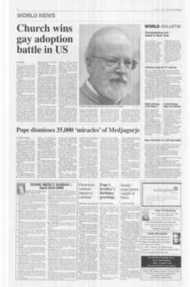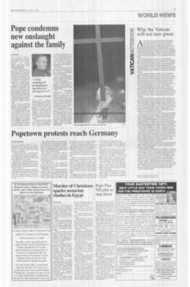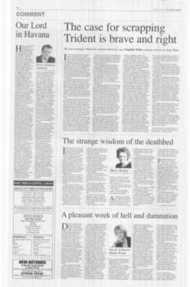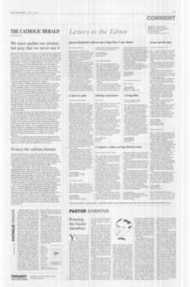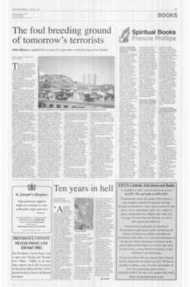Page 1, 21st April 2006
Page 1

Report an error
Noticed an error on this page?If you've noticed an error in this article please click here to report it.
Tags
Share
Related articles
Scottish Cardinal Criticises Brown Over Trident Speech
Vatican Supports Scots Over Trident
Bishops Call For Total Nuclear Disarmament
The Bishops Need To `get Real' Over The Nuclear Threat To...
Bishop Urges Faithful To Lobby Mps Over Plans To Renew...
Bishops urge the Government to abandon nuclear deterrent
Church calls for £20 billion earmarked for new nuclear missiles to be spent on Britain's poor BY FFIEDDY GRAY THE CATHOLIC Church in Britain has appealed to the
overrnnent to abandon plans for a £20 billion advanced nuciear missile system and give the money to the poor instead.
A bishop in England and the bishops of Scotland have joined farces to urge Prime Mini ster Tony Blair to decommission Trident. Britain's ageing nuclear weapons defence system, and not replace the missiles. Bishop Patrick O'Donoghue of Lancaster, a leading member of the Department of International Relations of the Bishops' Conference of England and Wales, said this week that having nuclear arms, even for the sake of deterrence, was wrong.
"I don't think nuclear armaments are the answer to any of the difficulties we face as a country," he said. "There can never be a justification for using nuclear weapons against people."
The bishop called on the Government to ditch plans to install a new £20 billion nuclear defence system, adding that the Government should give the money to the poor instead. "We need a reappraisal of our nuclear Weapons spending. These funds should be put aside to help the poor and marginalised in our midst," he said.
Bishop O'Donoghue's plea echoed an appeal by the Scot
tish bishops earlier this month. Eight Scottish prelates signed a statement saying that "the use of weapons of mass destruction must be a crime against God and humanity and it must never happen."
The bishops said that they welcomed comments made by Mr Blair that no decision on a replacement for Trident had yet been taken and that there should be the "fullest possible" public debate on the options.
However, the bishops added: "We urge the Government of the United Kingdom
not to invest in a replacement for the Trident system and to begin the process of decommissioning these weapons with the intention of diverting the sums spent on nuclear weaponry to programmes of aid and development:'
They repeated a statement issued by the Scottish bishops' conference in 1982. when Trident was first developed, which said: "If it is immoral to use these weapons it is also immoral to threaten their use."
The bishops also repeated the Church's condemnation of nuclear weapons contained in Gaudium et Spes, a 1965 document of the Second Vatican Council, and the warning in the 1992 Catechism of the Catholic Church that the accumulation of such weapons aggravated the causes of war rather than
eliminated them. Finally, they quoted Pope Benedict XVI, who in his January 1 World Peace Day message said that "in a nuclear war there would be no victors, only victims".
The bishops issued their statement after a meeting last week in Scotus College, Glasgow, where they discussed reports that Britain may be planning to replace Trident with a more advanced defence system.
Trident's nuclear missile warheads are carried on four
Vanguard-class strategic
nuclear submarines based at Faslane in Gare Loch in the West of Scotland, Some Catholics disagree with the bishops' views. Robin Harris, a former policy adviser to Margaret Thatcher, questioned whether they were in a position to speak publicly about nuclear deterrence.
"I don't think the bishops have even a quarter of knowledge required to make such a judgment," he said. "Nor do I think they have any duty or right to say that dismantling Trident is the more Christian option. It is clear that we do need an independent nuclear deterrent in a world with rising nuclear proliferation."
However, in this week's edition of The Catholic Herald, Sir Stephen Wall, a former adviser to Tony Blair and Cardinal Cormac Murphy-O'Connor, supports Britain's nuclear disarmament.
He writes: "I look at the combination of arguments: the horrendous cost, the diminished relevance of deterrence in the modern world and the moral argument, then I think the brave and right thing to do would be for Britain not to replace Trident and to cease being a nuclear power."
But in spite of such opposition it is widely expected that Britain will bring its nuclear capability up to date.
The Government has recently invested £300 million on new facilities at the Atomic Weapons Establishment in Aldermaston, Berkshire, and British and American scientists have been collaborating in Operation Krakatau, which is said to be a series of experiments to pave the way for a new generation of warheads to replace existing and rapidly ageing stockpiles.
In his first Easter message Pope Benedict XVI asked world leaders to find a peaceful solution to Iran's nuclear threat.
As tension between Teheran and the world powers mounts . the Pontiff called for "serious and honest negotiations" to reach "an honourable solution for all parties".
Pope Benedict's remarks came just days after Mahmoud Ahmadinejad, the President of Iran, appeared to threaten Israel with a nuclear strike, describing the country as a "rotten, dried tree" facing destruction by "one storm".
Sir Stephen Wall: Page 10 Editorial Comment: Page 11
blog comments powered by Disqus





